The Japan Society for the Promotion of Science (JSPS) Washington Office and the Fogarty International Center (FIC) at the National Institutes of Health (NIH) hosted the 2019 JSPS-NIH Forum on March 8, 2019. The JSPS-NIH Forum occurred at The Cloisters, Mary Woodard Lasker Center for Health Research and Education on the Bethesda, Maryland NIH campus.
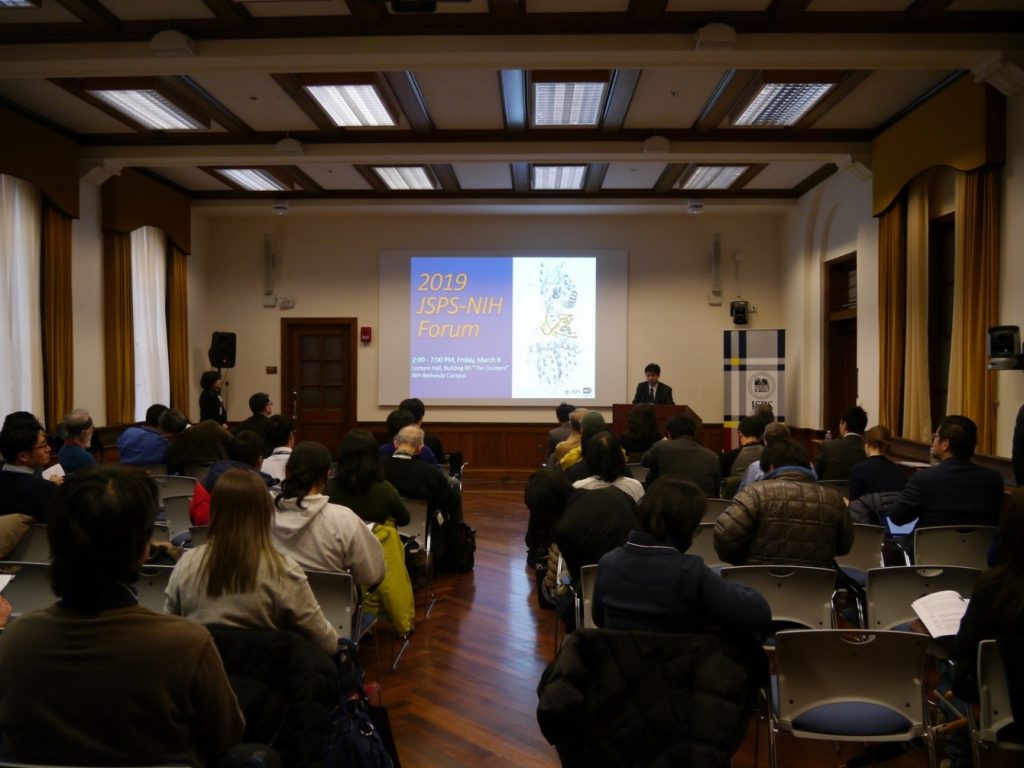
Prominent guest lectures were given by prior JSPS-NIH Fellows in a variety of fields. The fellows represented a wide range of biomedical disciplines, including the National Eye Institute (NEI), National Cancer Institute (NCI), National Institute on Aging (NIA), and National Institute Child Health and Human Development (NICHD). Short welcomes were given for those attending as well as brief introductions by the JSPS Washington Office.
The JSPS-NIH Fellowship for Japanese Biomedical and Behavioral Researchers at NIH (JSPS-NIH Fellowship or “Kaitoku-NIH”) is a unique and exciting chance for remarkable Japanese biomedical scientists to engage in research at NIH. The annual program admits approximately ten fellowships for up to two years of research funding. This fellowship invites young postdoctoral researchers from Japan to work in the United States with talented mentors and fellow scientists on ground-breaking laboratory research.
The 2019 forum brought two prior JSPS-NIH Fellows to present their current research: Dr. Yasumasa Iwatani of the National Hospital Organization Nagoya Medical Center in Japan, who presented his work on antiviral defense of APOBEC3 cytidine deaminases, and Dr. Reiko Horai of the National Eye Institute (NEI) at NIH, who spoke about her research on autoimmune uveitis and the gut microbiome in mice.
This year’s opening remarks were given by the JSPS Washington Office Director, Dr. Kohji Hirata; Science Counselor of the Embassy of Japan in the US, Mr. Seiichi Shimasaki. Each opening speaker addressed the audience with excitement regarding ongoing research by JSPS-NIH Fellows and how important their works are for scientific collaboration. They graciously thanked NIH for their continuing efforts to strengthen innovation and scientific inquiry with JSPS and remarked on fellowship alumni successes.
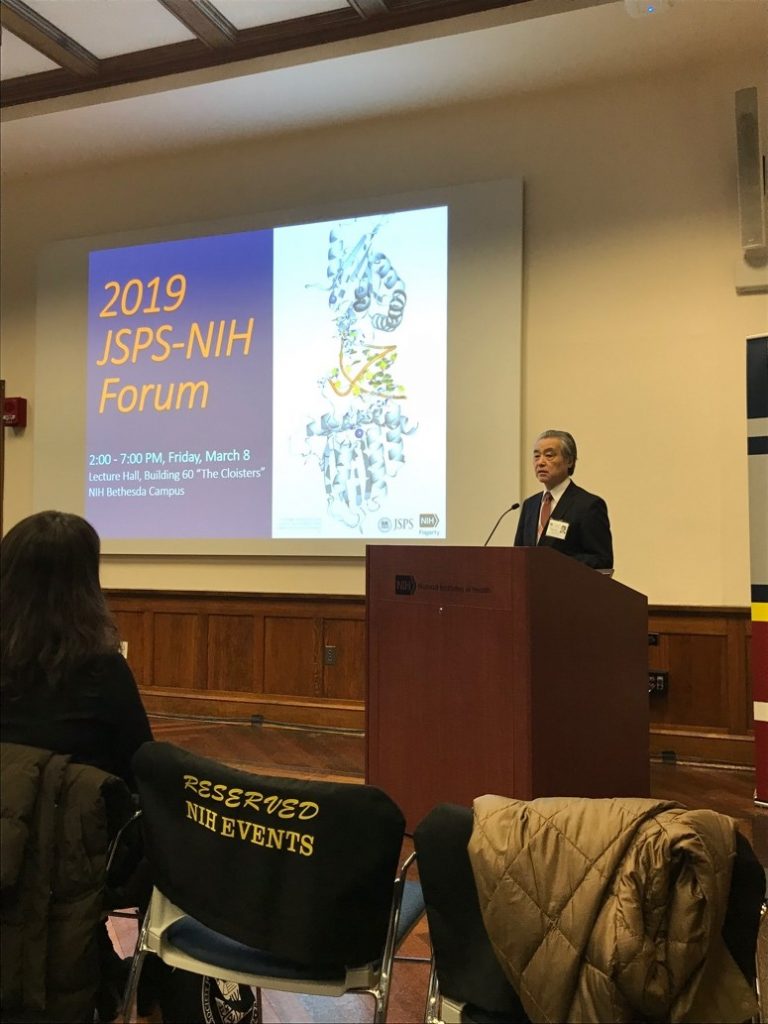
Opening Remarks (Dr. Kohji Hirata, Direcor, JSPS Washington Office)
■Alumni Keynote Lecture #1: Dr. Yasumasa Iwatani, Ph.D.
Dr. Yasumasa Iwatani’s lecture presented his most recent research involving an updated molecular model of cellular antiviral APOBEC3 cytidine deaminases. APOBEC3 stands for apolipoprotein B mRNA editing enzyme catalytic subunit 3, which belongs to the superfamily of polynucleotide cytidine deaminases. They commonly have deaminase activity, catalyzing the deamination of cytidine to uridine in DNA. In human, there are seven members (A-H), known as cellular antiviral factors.
These cytidine deaminases are enzymatic proteins that potently block viral gene synthesis of retroviruses, such as human immunodeficiency virus type-1 (HIV-1). Current scientific consideration suspects antiviral mechanisms that depend on enzymatic activity and/or the relationship with single-stranded (ss) DNA or RNA. HIV-1 inactivates the antiviral actions by expressing viral protein, called Vif (Virus infectivity Factor), and degrading the enzymes in infected cells.
In 2000, Dr. Iwatani jointed Dr. Judith Levin’s laboratory in NIH and focused on APOBEC3G that had first been discovered as antiviral APOBEC3. In order to determine biochemical characteristics of the protein in the laboratory, Dr. Iwatani and his team obtained APOBEC3G protein using a baculovirus expression system and analyzed its properties. The study revealed that APOBEC3G specifically deaminates ssDNA and preferentially binds to single-stranded nucleotides. Therefore, it has been believed that the antiviral mechanisms conferred by the other APOBEC3 members are attributed to ssDNA-specific deamination and single-stranded nucleotide affinity of the proteins.
However, recent studies by Dr. Iwatani and others suggest that an additional biochemical nature plays a critical role of APOBEC3-mediated antiviral action. Examining the primate APOBEC3H protein structure, Dr. Iwatani revealed the APOBEC3H forms a stable dimer mediated by double-stranded RNA (dsRNA). In addition, dsRNA-mediated dimerization of APOBEC3H is also important for cellular regulation of the protein as “anti-retroviral restritome”.
Further understanding of the details how APOBEC3H interacts with cellular or viral nucleotides is reliable for antiviral studies of the APOBEC3 family enzymes. Dr. Iwatani will move forward in his research to clarify the APOBEC3H-RNA interaction, how and what cellular (or viral) nucleotides regulate APOBEC3H’s antiviral activity.
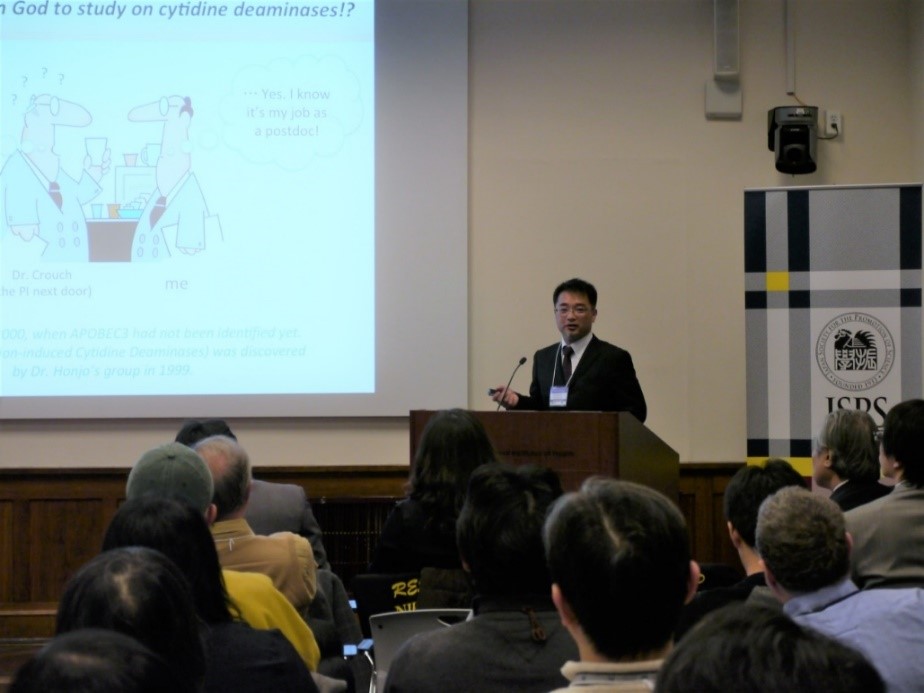
■Alumni Keynote Lecture #2: Dr. Reiko Horai, Ph.D.
Immediately following Dr. Iwatani’s lecture, Dr. Reiko Horai presented on autoimmune uveitis and its association with gut microbiota. Dr. Horai was a JSPS-NIH Fellow more than ten years ago and remarked on how valuable the collaboration is with colleagues at NIH. Dr. Horai, who is currently Staff Scientist at the National Eye Institute (NEI), spoke about her research involving eye diseases. Autoimmune uveitis includes noninfectious sterile intra-ocular inflammation, which is a sight-threatening disease due to irreversible retinal damage. The paradox she examined is how retina-specific autoreactive T cells become activated and enter the immunologically privileged eye, since these cells have to be activated in the periphery prior to crossing the blood-retinal barrier.
Dr. Horai and her team studied the transgenic R161H mouse strain, which spontaneously develops uveitis by two months of age.
This spontaneous uveitis is associated with activated T cells present in the gut. Dr. Horai removed all endogenous microbiome from R161H mice by broad-spectrum antibiotic treatment or by rederiving them to germ-free and observed disease attenuation, whereas re-introducing microbiota restored it.
The results confirmed that the commensal microbiota contribute to triggering spontaneous uveitis.
Her results support the hypothesis that retina-specific T cells are activated in the intestine, even before the onset of disease symptoms. By investigating the downstream of T cell receptor signaling and the stool extract of mice as stimulants to retina-specific T cells , the suspected results were confirmed; retina-specific T cells receive an activation signal in the gut and it comes from proteinaceous component of microorganisms,and this activation is sufficient to make pathogenic T cells to initiate uveitis.
Dr. Horai plans to continue searching for the culprit commensals of uveitis as well as understanding the mechanism of antigen vs. adjuvant effects. Her future work involves research with gnotobiotic mice, thanks to the establishment of a new NEI’s gnotobiotic facility, and proposes findings from microbiota studies as a potential treatment to autoimmune uveitis.
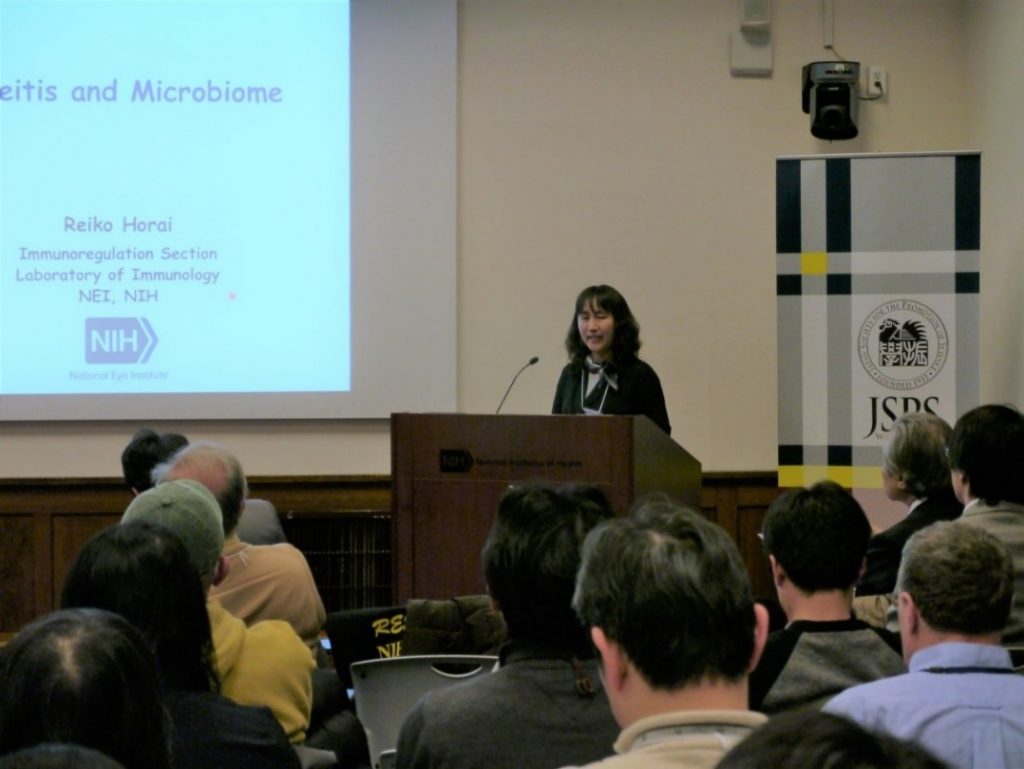 Dr. Reiko Horai, National Eye Institute (NEI), NIH
Dr. Reiko Horai, National Eye Institute (NEI), NIH■Presentations by Recent JSPS-NIH Fellows
Dr. Iwatani and Dr. Horai’s lectures preceded research presentations from three recent JSPS-NIH Fellows: Dr. Shogo Takahashi (FY2015 fellow), Dr. Kenta Tsutsui (FY2016 fellow), and Dr. Yuta Tanizaki (FY2017 fellow).
Dr. Shogo Takahashi completed his fellowship in the National Cancer Institute (NCI) in April of 2018 and currently works at Georgetown University Medical Center. He presented on his research involving bile acid break down differences between mammals. Farnesoid X receptor (FXR), a bile acid receptor, controls enterohepatic circulations of bile acids, regulates metabolism in both liver and intestine, and controls metabolic diseases, such as diabetes and obesity. His research revealed two key biotransformations of bile acids in humans and mice: 1) human bile acid has increased CDCA (chenodeoxycholate) compared to mouse bile acid, and 2) beta-MCA (muricholic acid) increases in mouse bile acid, but humans host none in bile acid. Altogether, MCA is not present in Cyp2c- null mice, and Cyp2c70 produces MCA from CDCA. The notable differences between human and mouse isoforms may not only be due to differing microbiomes- but also differing diets.
 Dr. Shogo Takahashi (FY2015 JSPS-NIH Fellow), Georgetown University Medical Center
Dr. Shogo Takahashi (FY2015 JSPS-NIH Fellow), Georgetown University Medical CenterDr. Kenta Tsutsui is a supplemental visiting fellow in the National Institute on Aging (NIA). He presented his research, which was published recently in Science Signaling, examining the key to the heart’s pacemaker rhythm identified as clock coupling at the sinoatrial node. As a human ages, the average heart rate decreases. A system of calcium and membrane clocks drive diastolic depolarization to produce an inward sodium current. In order to perform his research, Dr. Tsutsui and his team acquired a healthy, but rejected for transplantation, heart from the George Washington University Hospital. Through a variety of tests, Dr. Tsutsui revealed the coupled-clock system drives automaticity in both humans and animals.
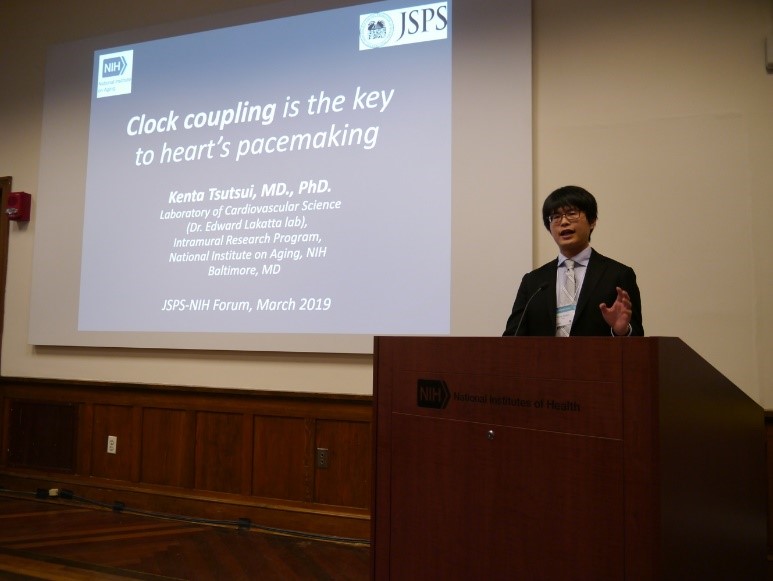 Dr. Kenta Tsutsui (FY2016 JSPS-NIH Fellow), National Institute on Aging (NIA), NIH
Dr. Kenta Tsutsui (FY2016 JSPS-NIH Fellow), National Institute on Aging (NIA), NIHDr. Yuta Tanazaki is currently a visiting fellow in the National Institute Child Health and Human Development (NICHD). He presented his research regarding thyroid hormones (TR), which are critical for postembryonic development. Dr. Tanazaki’s research examined the role of TRα in Xenopus tropicalis intestinal remodeling,which he found to regulate intestinal stem cells. Regulation of cell cycle genes partially leads to proliferation of these stem cells.
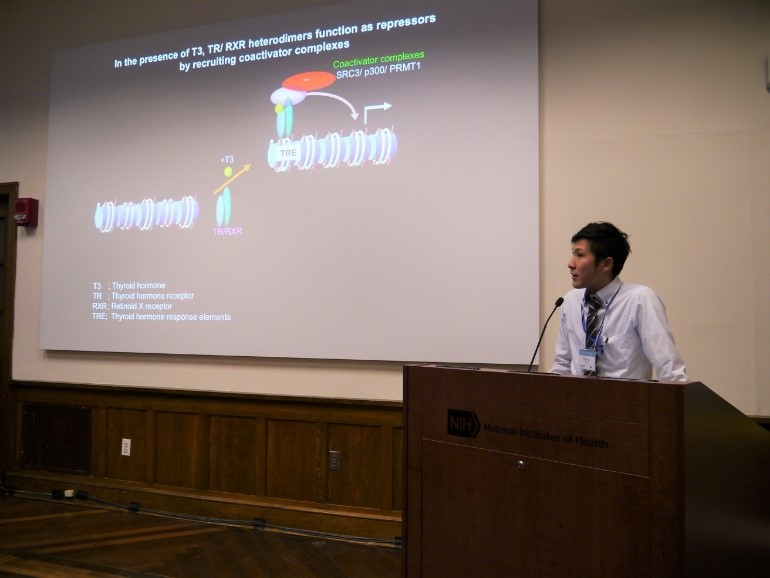 Dr. Yuta Tanizaki (FY2017 JSPS-NIH Fellow), National Institute Child Health and Human Development (NICHD), NIH
Dr. Yuta Tanizaki (FY2017 JSPS-NIH Fellow), National Institute Child Health and Human Development (NICHD), NIH■Introductions to the 2018 Class of JSPS-NIH Fellows
Lastly, seven fellows from the 2018 awarded JSPS-NIH Fellows presented their research in three minutes each. Each fellow gave a brief introduction regarding their education and research expertise with a short presentation regarding their current work at NIH. The former fellows were intrigued to discover what the newest fellows are researching and provided a chance to cover a broad range of biomedical disciplines from six different institutes at NIH. These “Flash Talks” were quick in nature and provided an efficient opportunity for the current fellows to provide insight into what is the ongoing research across the NIH campus.
 Dr. Wakako Asada, National Institutes of Allergy and Infectious Diseases (NIAID), NIH
Dr. Wakako Asada, National Institutes of Allergy and Infectious Diseases (NIAID), NIH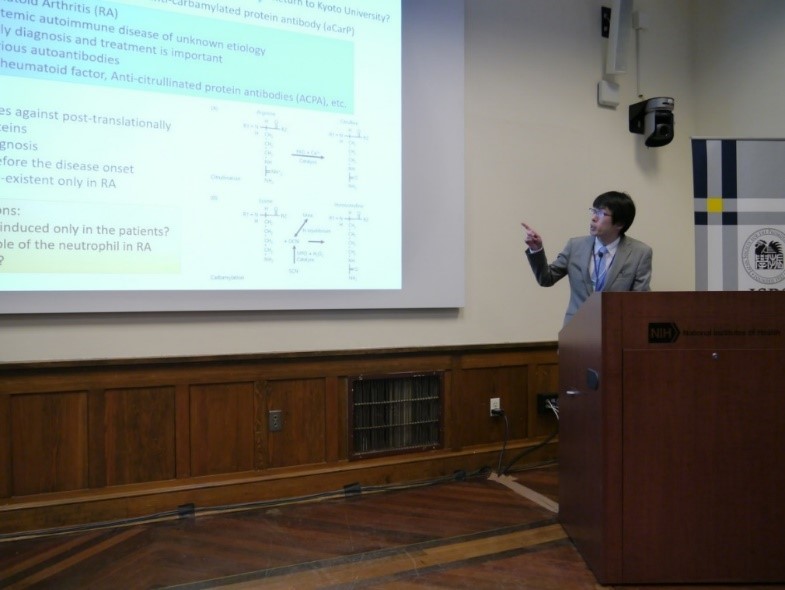 Dr. Shuichiro Nakabo, National Institute of Arthritis and Musculoskeletal and Skin Diseases (NIAMS), NIH
Dr. Shuichiro Nakabo, National Institute of Arthritis and Musculoskeletal and Skin Diseases (NIAMS), NIHThe forum attracted a variety of captivated attendees: alumni of the JSPS-NIH fellowship, NIH researchers and scientists, Fogarty International staff, colleagues of JSPS-NIH fellows, and future fellowship applicants. The audience was extremely engaged and asked questions to the presenters regarding research considerations and future directions.
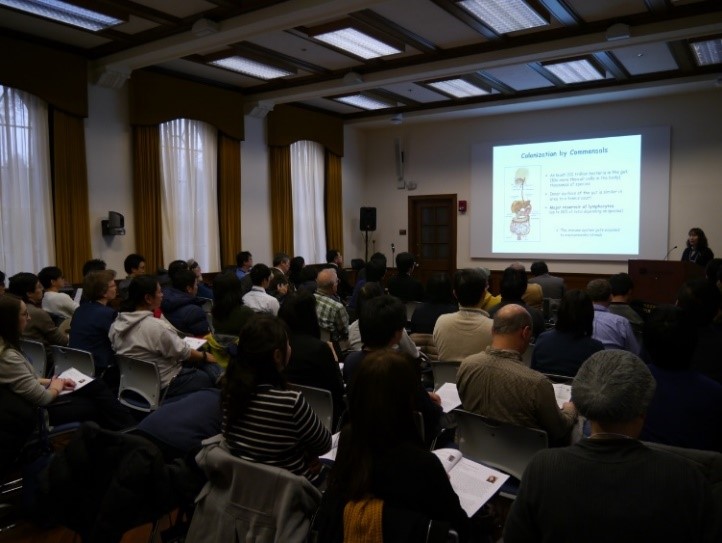 Presentations on the NIH Research
Presentations on the NIH ResearchClosing remarks for the forum were given by Dr. Yoh-suke Mukouyama, Chair of the JSPS-NIH Fellowship Review Panel and a Senior Investigator in the National Heart, Lung, and Blood Institute (NHLBI), instead of Dr. Keiko Ozato, Former Chair of the JSPS-NIH Fellowship Review Panel. Dr. Mukouyama noted how successful the fellows have been, specifically highlighting the accomplishments of Drs. Iwatani and Horai. He invited the fellows to enjoy the multidisciplinary environment of the NIH. Dr. Mukouyama depicted an eloquent metaphor between science and climbing a mountain, based on a story in the NIH Demistifying Medicine Lecture presented by Dr. Lou Reichardt, a noted neuroscientist and mountaineer who is the first American to summit both Everest and K2: the process of reaching the summit is much more important than summiting. Although the duration of summitting is short, more is ahead.
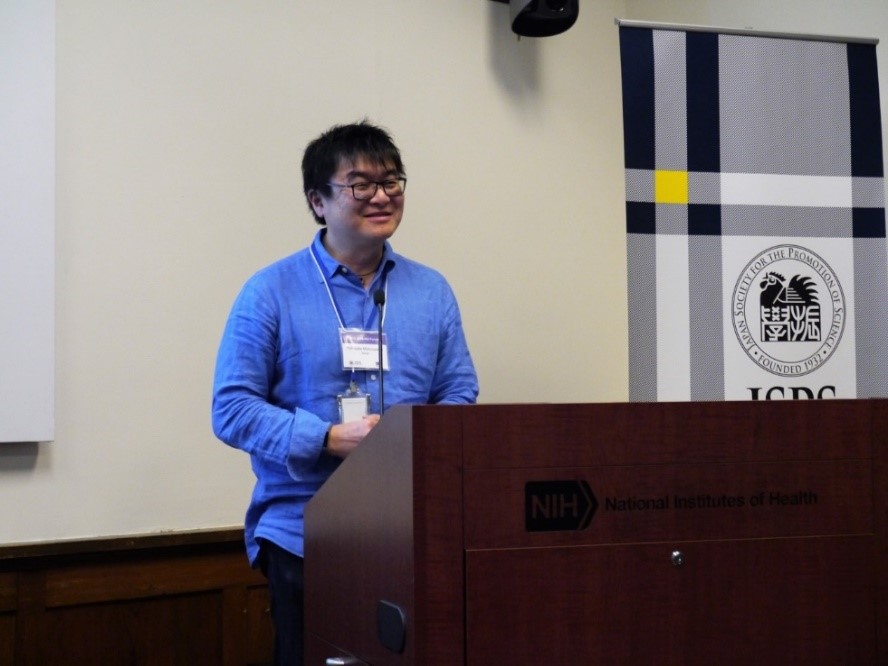 Dr. Yoh-suke Mukouyama, National Heart, Lunch, and Blood Institute (NHLBI), NIH
Dr. Yoh-suke Mukouyama, National Heart, Lunch, and Blood Institute (NHLBI), NIH■The Reception: Honoring JSPS-NIH Fellows, Alumni, and the JSPS-NIH Collaboration
Immediately following the forum, JSPS Washington Office offered all presenters and attendees to meet each other and the discuss the forum as well as the fellowship program and JSPS-NIH partnership. The reception occurred in the exquisite wood-paneled reconstructed chapel next to the forum room.
Dr. Kohji Hirata, the Director of JSPS Washington Office, Dr. Michael Gottesman, Deputy Director for International Relations, and Ms. Tina Chung, Program Officer for East Asia and the Pacific Division of IR, Fogarty International Center, shared sincere thoughts regarding the importance and value of the JSPS-NIH partnership.
Dr. Hirata thanked Dr. Gottesman for his continuous and unwavering encouragement for the JSPS-NIH relationship. Ms. Chung revered the successful cooperation between JSPS and NIH, which has led to a rewarding relationship.
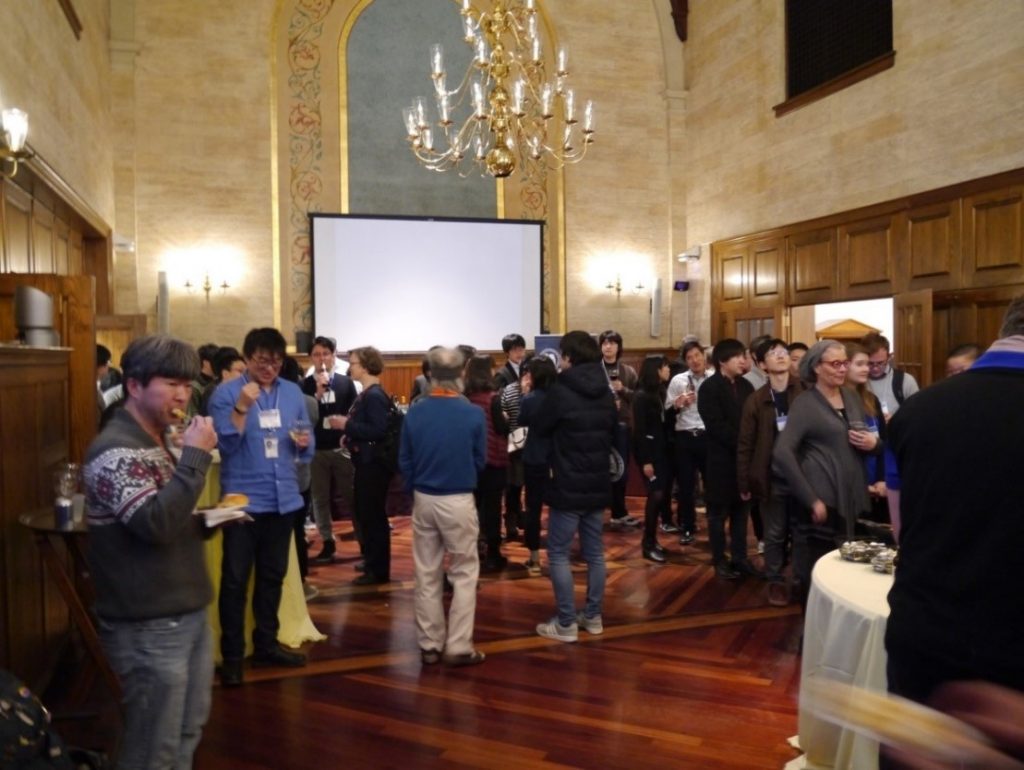 Reception
Reception
Dr. Kohji Hirata, JSPS Washington Office, introduces Ms. Tina Chung, Fogarty International Center, and Dr. Michael Gottesman, Deputy Director for International Relations,NIH

Lastly, Dr. Gottesman remarked that although many of the fellows have returned home to Japan, he thanked the fellows for their hard work, specifically noting Dr. Mukouyama’s dedication to the fellows and their scientific reviewers. Dr. Gottesman heartfully congratulated the incoming fellows and anticipated a wonderful experience, as a reflection of how wonderfully successful the forum was. He expressed that the symposium represents a long-term relationship of research collaboration and thanked the fellows on their training and commitment. Dr. Gottesman closed the toast with an acknowledgement to exciting future events, where he looks forward to hearing more fellows share their research activities.
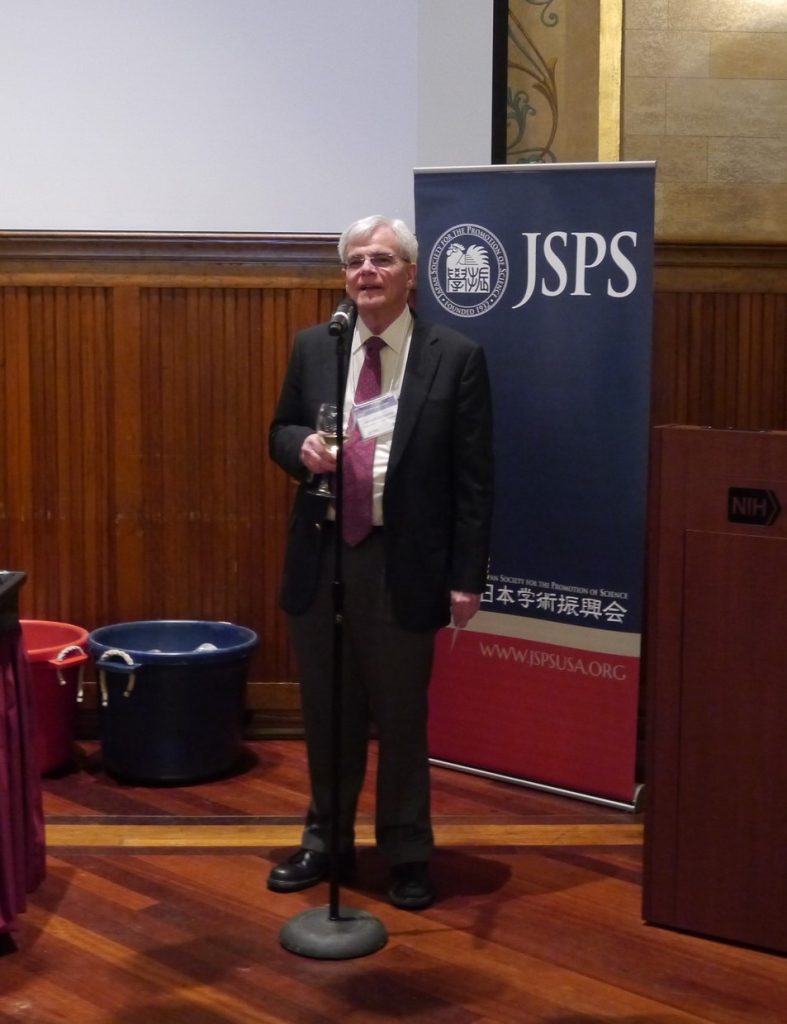
Toast by Dr. Michael Gottesman, Deputy Director for Intramural Research, NIH
After the toast, the reception attendees gathered together for lively discussion amongst colleagues, friends, and new acquaintances. They spoke about research interests and the Judo group Dr. Mukouyama mentioned during the introductions of Dr. Iwatani at the beginning of the Alumni Keynote Lecture. JSPS-NIH fellows spoke, also, to each other, encouraging the newest fellows to branch outside of their discipline and attend various talks across the NIH campus. Drs. Iwatani and Horai, in particular, had many individuals asking about their research work.
Inquiring about the impressions from the forum, the current fellows and alum spoke excitedly and positively as to the presentations and fellowship as a whole. Dr. Iwatani, the first invited speaker, remarked that he continues to work with colleagues from the fellowship: “PI and postdoc relationships are very important.” His advice for early-career scientists is to “Challenge yourself.”
Dr. Horai, the second guest speaker of the forum, provided advice for current fellows and early-career scientific researchers. She said “Working hard is one thing. Try to be open-minded. Try to attend seminars of unrelated subjects that can help develop your ideas. Try to collaborate.” Regarding her career goals, Dr. Horai said “If I did not get JSPS-NIH Fellowship, I am not sure I would be here,” remarking on how wonderful the opportunity of the fellowship was for her and her career.
Dr. Jeffrey Kopp, who is the Kidney Diseases Branch Chief of the National Institute of Diabetes and Digestive and Kidney Diseases (NIDDK), remarked that he had JSPS fellows in his laboratory in the past. Dr. Kopp personally encouraged a Ph.D. student in his laboratory, who was attending, to apply for the JSPS-NIH Fellowship because “It gives you a sense of comradery of attending these gatherings, which makes a smaller community within NIH with so many people.” Other attendees appreciated and were impressed by the array of topics discussed and that multiple disciplines were represented. They were grateful that many different biomedical sciences were discussed.
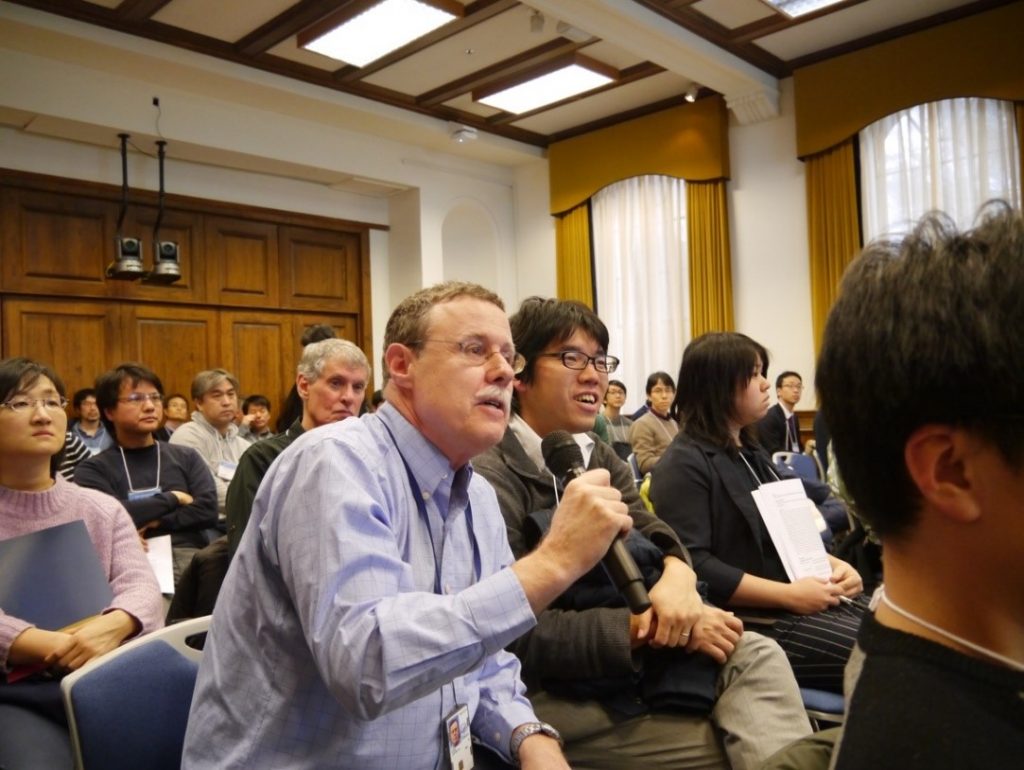 Dr. Jeffrey Kopp, National Institute of Diabetes and Digestive and Kidney Diseases (NIDDK), NIH
Dr. Jeffrey Kopp, National Institute of Diabetes and Digestive and Kidney Diseases (NIDDK), NIH
Dr. Wakako Asada offered advice for young scientific researchers, encouraging Japanese researchers to attend foreign conferences and experience life abroad. Dr. Asada stated “The first time is difficult, but relationships are important.” Another current fellow concurred with Dr. Asada; his relationship with his PI has been the most valuable aspect of the JSPS-NIH Fellowship. One fellow alum commented on how quick the two years went by for her project and appreciated her PI’s continued involvement. Many current fellows and alum offered advice for new fellows to attend Kin’yō-kai, a weekly meeting of Japanese researchers to discuss their work at NIH. They remarked on how critical it has been to build friendships through such opportunities as Kin’yō-kai and JSPS.







